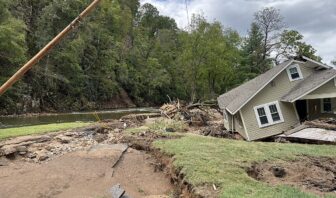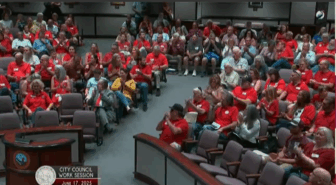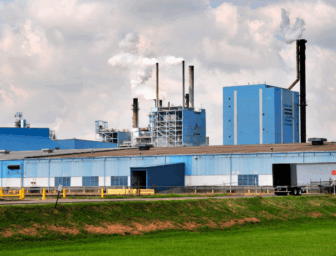Activists Call on Board of Public Works to Reject Eastern Shore Pipeline Ahead of Key Decision
Board of Public Works expected to issue or reject key permit in early November
ANNAPOLIS, MD – Top progressive environmental and justice advocates held a telepress conference today, calling on Governor Hogan and the Board of Public Works to reject the proposed Eastern Shore Pipeline project. The BPW is expected to issue a decision on a key permit for the project in early November.
Activists also released a new spatial analysis, conducted by GIS expert Stephen Metts, showing that the project runs through primarily majority-minority and low-income communities. The topline finding is that there is a predominance of Environmental Justice (EJ)-eligible census block groups up and down the two proposed projects. In fact, there are only four of 40 one-mile study area tracts that are not EJ-eligible. There is particularly high risk at the head of the Del-Mar project in the city of Salisbury, which is where the developers are planning to site a “renewable natural gas facility” — using waste from livestock, which is associated with a host of additional health threats.
Email denise@chesapeakeclimate.org to request a recording of the press conference.
The pipeline is already under construction in Delaware to carry gas from that state into Maryland. The seven miles of pipeline proposed for Maryland would supply concentrated animal feeding operations, businesses, and residential areas. The two “anchor” customers for gas delivery are the Eastern Correctional Institute (ECI) and the University of Maryland Eastern Shore (UMES) in Somerset County. If built, the Del-Mar pipeline would trigger the second pipeline proposed by Chesapeake Utilities connecting the prison to the university. The installation of the Del-Mar pipeline will impact 1,239 square feet of streams and more than 30,000 square feet of wetlands and wetland buffers. It is anticipated to come online in late 2021.
“Water is essential to human life all over the world, but here in Maryland, it’s an especially important part of our culture and economy,” said Susan Olsen, chair of the Sierra Club’s Lower Eastern Shore Group. “At a time when clean, renewable energy is affordable and abundant, we shouldn’t be building dirty, dangerous fracked gas pipelines. Our state should reject the Eastern Shore fracked gas pipelines — the health of Maryland’s water, economy, and people depends on it.”
The Board of Public Works is expected to decide on the wetlands permit for the Del-Mar pipeline portion in early November, after Governor Hogan’s Maryland Department of the Environment (MDE) recommended approval earlier this month. MDE is still reviewing the impacts the Chesapeake Utilities Project will have on the region’s wetlands and a separate decision on that portion is expected in early 2021.
“Putting in this pipeline will damage my campus community and the local community because it is not sustainable,” said Jailynn Britt, student at University of Maryland Eastern Shore and UMES delegate for the MaryPIRG’s climate justice group. “It will create long-lasting problems that affect the water and the air, which in the long run, hurts the people in this already impoverished community. It also will hurt an already small HBCU, which needs more help, not more problems.”
On the call, activists explained how the Hogan Administration has put its thumb on the scale for this project. While studies have shown that there are cheaper, viable alternatives to gas, including electrification and geothermal energy, the State of Maryland didn’t consider any of these options. Instead, it only requested applications for a gas pipeline to supply gas to two state-run facilities. And every contract that Maryland Environmental Services has awarded since the passage of the fracking ban has unduly prioritized fracked gas. Key excerpts from each of the four contracts awarded are linked here.
“We know that the Eastern Shore, which is essentially surrounded by water, is ground zero for climate change in Maryland,” said Anthony Field, Maryland Grassroots Coordinator at the Chesapeake Climate Action Network. “We also know that the expansion of dangerous gas infrastructure like this is a major step in the wrong direction. Importing fracked gas runs counter to MD’s commitment to climate action.”
This also comes on the heels of a new white paper released by CCAN, the Sierra Club, and the Wicomico Environmental Trust, showing that these fracked-gas pipelines would be an economic boondoggle. The economics of gas are faltering, with hundreds of gas companies expected to declare bankruptcy by the end of next year. These bankruptcies, combined with Maryland’s commitment to tackling climate change through electrification of buildings, raises concerns that investing in new gas infrastructure will lock ratepayers into paying for decades for a product that will not be viable for that long.
“It is economically foolish to build the very expensive polluting infrastructure of gas pipelines and equipment, which is already outpriced by highly competitive and non-polluting solar and wind,” said John Groutt of the Wicomico Environmental Trust. “The pipelines will become worthless stranded assets within a very few years, leaving Maryland taxpayers to continue paying for it for years to come.”
The fracked-gas industry is faltering. Companies behind the proposed Atlantic Coast Pipeline cancelled the project due to ballooning costs and legal uncertainties. And the Dakota Access pipeline was ordered to shut down for an environmental review. Meanwhile, in late June, the fracking giant Chesapeake Energy filed for bankruptcy. These setbacks for the industry demonstrate that fracking is a risky investment, for the climate, the environment, and the economy.
These two pipelines are part of the Hogan Administration’s plans to spend $103 million massively increasing fracked-gas pipelines and infrastructure in the state. This includes $30.3 million administered by the Maryland Energy Administration’s (MEA) new Maryland Gas Expansion Fund “for the expansion of natural gas infrastructure.” The remaining $70 million is recoverable from MD ratepayers. Read more about it here.
###
The Chesapeake Climate Action Network is the first grassroots organization dedicated exclusively to raising awareness about the impacts and solutions associated with global warming in the Chesapeake Bay region. For 17 years, CCAN has been at the center of the fight for clean energy and wise climate policy in Maryland, Virginia, and Washington, D.C.





